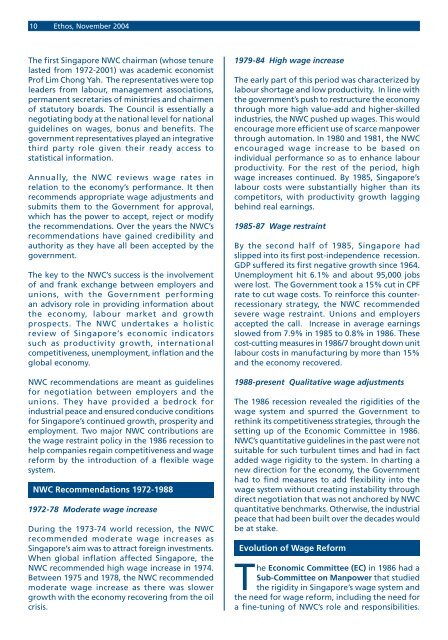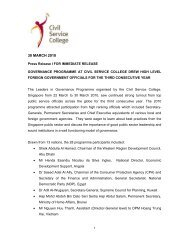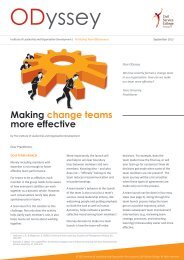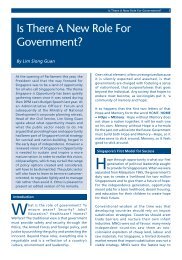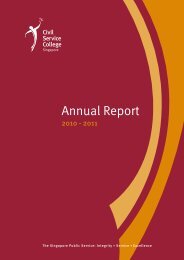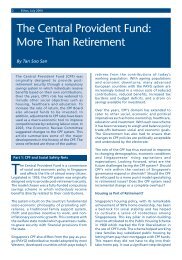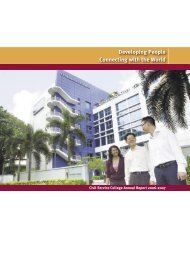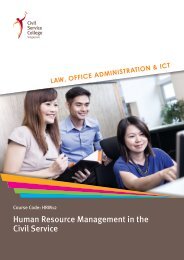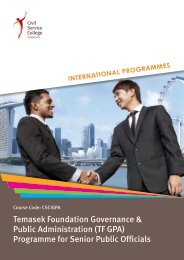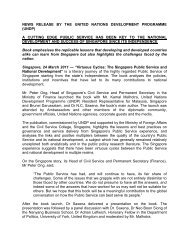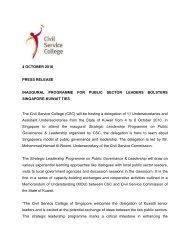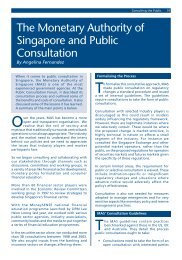Wage Reform & Tripartism : A Test of Trust At Work - Civil Service ...
Wage Reform & Tripartism : A Test of Trust At Work - Civil Service ...
Wage Reform & Tripartism : A Test of Trust At Work - Civil Service ...
You also want an ePaper? Increase the reach of your titles
YUMPU automatically turns print PDFs into web optimized ePapers that Google loves.
10 Ethos, November 2004The first Singapore NWC chairman (whose tenurelasted from 1972-2001) was academic economistPr<strong>of</strong> Lim Chong Yah. The representatives were topleaders from labour, management associations,permanent secretaries <strong>of</strong> ministries and chairmen<strong>of</strong> statutory boards. The Council is essentially anegotiating body at the national level for nationalguidelines on wages, bonus and benefits. Thegovernment representatives played an integrativethird party role given their ready access tostatistical information.Annually, the NWC reviews wage rates inrelation to the economy’s performance. It thenrecommends appropriate wage adjustments andsubmits them to the Government for approval,which has the power to accept, reject or modifythe recommendations. Over the years the NWC’srecommendations have gained credibility andauthority as they have all been accepted by thegovernment.The key to the NWC’s success is the involvement<strong>of</strong> and frank exchange between employers andunions, with the Government performingan advisory role in providing information aboutthe economy, labour market and growthprospects. The NWC undertakes a holisticreview <strong>of</strong> Singapore’s economic indicatorssuch as productivity growth, internationalcompetitiveness, unemployment, inflation and theglobal economy.NWC recommendations are meant as guidelinesfor negotiation between employers and theunions. They have provided a bedrock forindustrial peace and ensured conducive conditionsfor Singapore’s continued growth, prosperity andemployment. Two major NWC contributions arethe wage restraint policy in the 1986 recession tohelp companies regain competitiveness and wagereform by the introduction <strong>of</strong> a flexible wagesystem.NWC Recommendations 1972-19881972-78 Moderate wage increaseDuring the 1973-74 world recession, the NWCrecommended moderate wage increases asSingapore’s aim was to attract foreign investments.When global inflation affected Singapore, theNWC recommended high wage increase in 1974.Between 1975 and 1978, the NWC recommendedmoderate wage increase as there was slowergrowth with the economy recovering from the oilcrisis.1979-84 High wage increaseThe early part <strong>of</strong> this period was characterized bylabour shortage and low productivity. In line withthe government’s push to restructure the economythrough more high value-add and higher-skilledindustries, the NWC pushed up wages. This wouldencourage more efficient use <strong>of</strong> scarce manpowerthrough automation. In 1980 and 1981, the NWCencouraged wage increase to be based onindividual performance so as to enhance labourproductivity. For the rest <strong>of</strong> the period, highwage increases continued. By 1985, Singapore’slabour costs were substantially higher than itscompetitors, with productivity growth laggingbehind real earnings.1985-87 <strong>Wage</strong> restraintBy the second half <strong>of</strong> 1985, Singapore hadslipped into its first post-independence recession.GDP suffered its first negative growth since 1964.Unemployment hit 6.1% and about 95,000 jobswere lost. The Government took a 15% cut in CPFrate to cut wage costs. To reinforce this counterrecessionarystrategy, the NWC recommendedsevere wage restraint. Unions and employersaccepted the call. Increase in average earningsslowed from 7.9% in 1985 to 0.8% in 1986. Thesecost-cutting measures in 1986/7 brought down unitlabour costs in manufacturing by more than 15%and the economy recovered.1988-present Qualitative wage adjustmentsThe 1986 recession revealed the rigidities <strong>of</strong> thewage system and spurred the Government torethink its competitiveness strategies, through thesetting up <strong>of</strong> the Economic Committee in 1986.NWC’s quantitative guidelines in the past were notsuitable for such turbulent times and had in factadded wage rigidity to the system. In charting anew direction for the economy, the Governmenthad to find measures to add flexibility into thewage system without creating instability throughdirect negotiation that was not anchored by NWCquantitative benchmarks. Otherwise, the industrialpeace that had been built over the decades wouldbe at stake.Evolution <strong>of</strong> <strong>Wage</strong> <strong>Reform</strong>The Economic Committee (EC) in 1986 had aSub-Committee on Manpower that studiedthe rigidity in Singapore’s wage system andthe need for wage reform, including the need fora fine-tuning <strong>of</strong> NWC’s role and responsibilities.


